|
|
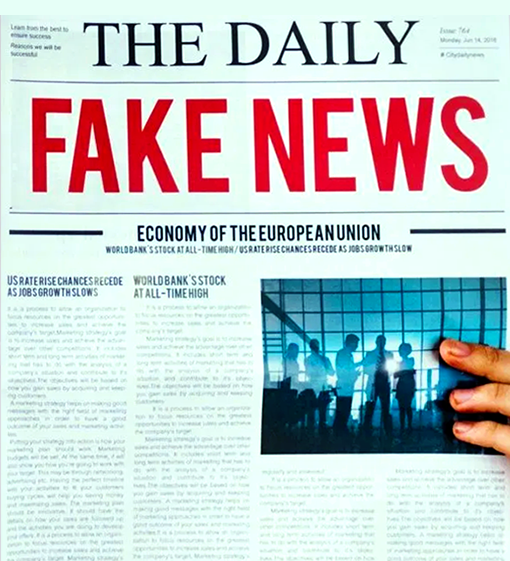
|

|
|
|

|

|
The winter of 1999-2000 found me driving to
We had grown up in the tropical paradise island of sunny Puerto Rico, where the only time you saw snow, was on television shows and the movies. Up to the time I moved to Cleveland in 1977, it had not occurred to me -strange as it may seem, that snow was actually freezing cold. Everyone on television seem to be having a great time playing in the snow, just like us island-boys had a good time at the beach in 84 degree weather. So while we had seen snow -in theory, we had never experience the cold -through television!

|
||
|
These images illustrate why, when you grow up in a tropical paradise, snow can be a bit of a shock. But what you never anticipate, is the cold. |
I was enrolled in the master's program with the goal of getting my
During that semester I started doing research for my essay paper for the next two semesters. My group instructor and counselor in Vermont was
The resulting essay was:

|
||
|
|
Public opinion is the key to maintaining control; maintaining control is the key to power. An approving or at least acquiescent public opinion is the foundation of all government. Public opinion ultimately is as decisive in a totalitarian state or empire as in a democracy.
Part One of this essay will provide basic examples and definitions of general interest, and deal specifically with the issue of the manipulation of public opinion through the universal use of propaganda and how propagandist have employed art to achieve their aims. Part Two explains how American propaganda has been utilized in maintaining control of the Caribbean island of Puerto Rico.
However, at this point of the reading, before you the reader proceed any further, I will take a pause to make a statement that is relevant to my arguments; that being that
And furthermore, like the vast majority of the American people, I have a problem with duplicity, particularly when all its shades of insincerity, deceitfulness, deception and dishonesty are veiled under the American democratic creed and mantel of freedom, liberty, equality, and justice
Why am I unveiling myself before you having thus barely completed the road to this introduction? I will tell you. I grew up in the American colony of Puerto Rico under a
The fact that this colonial control has lasted so long is a direct result of an effective and systematic use of psychological propaganda, which has been able to maintain a good level of favorable public opinion in Puerto Rico towards the United States, and has kept the people of the United States in complete ignorance of the things being done in their name.
It has taken me twenty years since I relocated to my birthplace in the U.S. mainland -and a lot of reading and research, to clear the cow-webs that were blinding me to the reality of my former state of being while living another twenty years under a torrent of propaganda in a tropical
However, it is because I have a bias, that I will endeavour at this point to clarify that my bias is informed and based on personal (and collective) experience, and that I will take pains to be as precise and as accurate as public sources of information allow in the exposition of my reasoning.
Through this essay I will present facts and arguments that will, for lack of a better word, inform or enlighten the reader about the paradoxical nature of the
And in completion, considering the fact that I am an artist, that is (allow me to elaborate), a practicing painter who is conscious of the truism that art and artist have always been a part and tool of political propaganda, I would like to explore and find examples of what set of skills not commonly associated with art making an artist must develop to be successful in the psycho-political field.
I will seek these examples among my own experience during my years in Puerto Rico. It is my belief that knowing propaganda techniques will enable the artist who has an interest in civic affairs to better focus the force of his creative skill in order to achieve maximum effectiveness.
You the reader may wonder (if you share some degree of culture) -why would an artist want to abandon the lofty abode of those who search universal aesthetic enlightenment, risking the safety of that unperturbed no-man's land of critical neutrality, to forcefully enter the treacherous trenches of politicized terrain?
Let me provide you with one answer. Having experienced foreign political manipulation and the pressing social problems it creates, I feel a compelling need to call attention to this state of affairs by reporting what I have witnessed. In plain words, I want to select moments from my experience; through my art, I want to call your attention to something.
To persuade others is to influence public opinion. Therefore, images like a painting or a photograph, such as

|
||
|
Detail from |
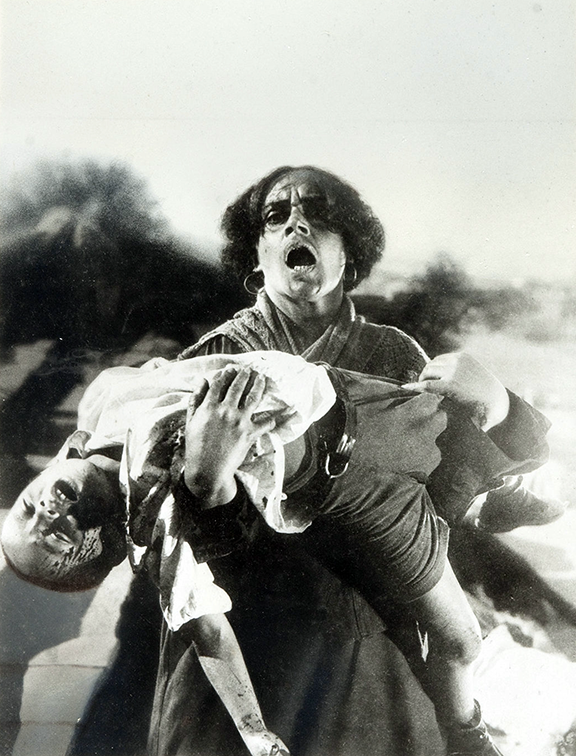
|
||
|
Film still from |
But how does an artist select -or creates- an image that is both informative and persuasive? An image that merely informs but does not persuade makes for very weak propaganda. Therefore, the artist must be skilled in the techniques that improve his selection of the reporting image if persuasion is to be achieved.

|
||
|
|
In the April 9th of 2000 Sunday edition,
First reported by the

| ||
|
The Cleveland Plain Dealer |
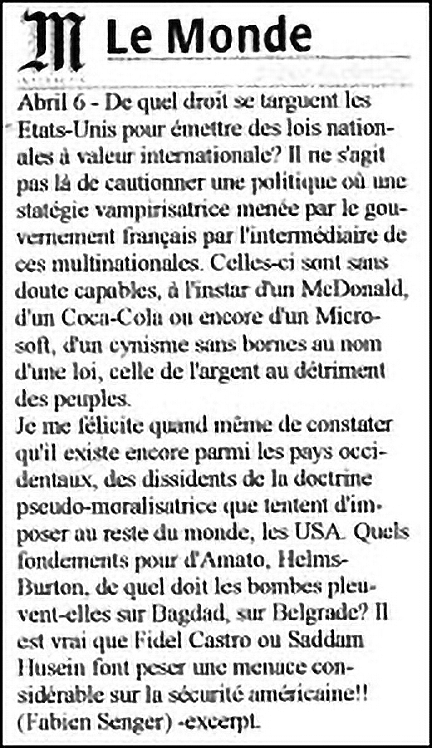
|
||
|
Le Monde |
The public's favor is what determines the success and failure of a policy decision that would, for example, launch a new consumer product such as
For better of for worse public opinion may be
With the rapid development of advanced communications such as the
The determination, enunciation, and execution of national policy require that the public opinion factor be taken fully into account. This process, he argues, should provide a foundation or base from which the propagandist can operate with some hope of success in creating a favorable world opinion towards the United States.2
But affecting public opinion involves influencing people's behavior either by establishing a new attitude (as in favoring a new product or a candidate running for first-time election) or by hoping to change an already existing attitude (as in trying to get people to switch from one soft drink to another or to re-elect someone for whom they voted before).
However, people will not change their attitude and their behavior
Propaganda was originally defined as the dissemination of biased ideas and opinions, often through the use of lies and deception. As scholars began to study the topic in more detail, many came to realize that propaganda was not the sole property of
And, since the ultimate goal of modern propaganda is having the recipient of the message (the targeted audience) come to
Because propaganda is frequently accompanied by distortions of fact and by appeals to passion and prejudice, it is often thought to be invariably false or misleading. However, this is a relative view. Although the propagandist may intentionally distort facts, others may present it as faithfully as objective observers.
For example: education, whatever its objectives, is a form of propaganda as much as a billboard advertisement or a political cartoon. In addition, no matter what the message may be, propaganda attempts to persuade through rational or emotional appeal or through the organization of personal opinion. The essential distinction in types of propaganda lies in the intentions of the propagandist.
According to propaganda experts
To Influence people the propagandist has a wide range of sophisticated propaganda techniques which, to use one example, have been evident in election campaigns. These include the propaganda of the deed (influencing public opinion by actions rather than words), the use of television, the manufacture of news by staged events, the skilful recruitment and use of opinion leaders, and the adjustment of appeals to group interest. These techniques vary in their sophistication, range, and effectiveness, but they all try to persuade by implementing the following principles:
1. Distract the audience (the listener, the viewer or the reader) from the complete picture.
2. Encourage the audience to look only at the factors that are important to accepting the propagandist's argument as true.
3. Offer propaganda as a reason to believe the argument, when in reality, it will provide weak, distracting, or irrelevant reasons.
4. Some of these persuasive techniques may be relevant to your decision to agree or not, but others will not be.5
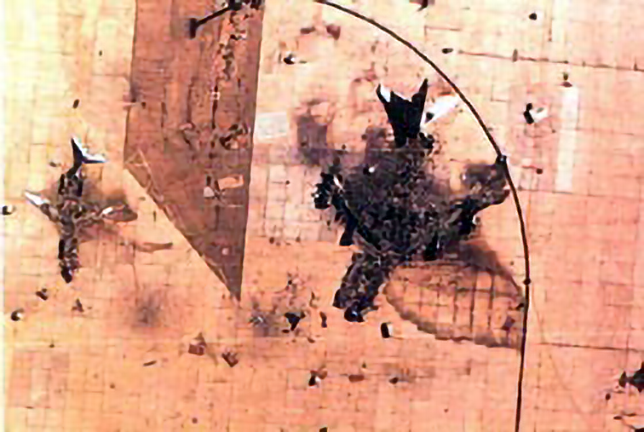
|
||
|
Persian Gulf War Satellite Photograph. Surgical bombing in operation |
There are many
Often, the celebrity is not qualified to express an opinion on the subject. For example: movie stars are used to recommend a product they may know nothing about. Testimonials can be used in a positive way as well. If the person quoted is truly an authority on the subject being talked about, the testimonial can support an argument. An authority on a subject could be a person who can give advice based on experience.

| ||
|
|

|
||
|
|

|
||
|
|
The above image is an example of propaganda utilizing a

|
||
|
|
Notice the above right image. It illustrates an extremely effective and accessible tool for propaganda scare tactics. Some five million comic books were disseminated in Latin America. Some of the storylines: University students were
Regardless of the tactics used by propagandists to influence public opinion, propaganda has some shortcomings with the audience to rely upon it alone. This is because the audience is made up of individuals who may not be receptive to the message. As in the parable of the farmer spreading the seeds, propaganda will not take hold on the intended audience unless the "mental" ground is favorable for the message to take root.
For example, seeing is not necessarily believing: two people viewing the same object may see entirely different things, and both may have a completely false impression of what the object actually is. The reason, grossly oversimplified, is that they are seeing with the mind as well as with the eye. Everyone considers the message from his or her own particular point of view based upon its own disposition, knowledge, experience, observations, interests, and all other factors we generally encompass in the word
As in the case of French public opinion's perceptions about the United States, their perspective (as observed by Oren Stephan in his book
The idea that art may be used to influence social behavior is regarded by some as
A survey of the history of art indicates that neither the rulers, the revolutionaries, nor the philosophers ignored the importance of emotion in human affairs. Medieval churchmen, the leaders of the Counter Reformation (which, by the way, were the first to coin the word "propaganda"), the art officials at the court of Louis XIV, and the ministers of cultural affairs in certain modern states have all demanded that art convey a message to the masses.
This of course was not a new concept. Ancient empires such as the Egyptians, the Babylonians, the Romans or the Byzantine had used art on
Art historian
Lieth also points out that while the French revolutionaries failed to mobilize the arts effectively (their regime did not have the stability necessary for such control), their intentions remained significant. They brought the modern state to the threshold of totalitarianism in the fullest sense of the word –that is, mobilization of every available instrument for impressing ideas on the minds of others. Since the French revolution various totalitarian regimes have taken up the idea of total mobilization of the mass media in order to indoctrinate the masses: Bolshevik Russia, Nazi Germany, Red China, and Castro's Cuba -not to mention the regimes on the right since Napoleon.

|
||
|
|
Government propaganda is also a big part of democratic countries, though official agencies now prefer to refer to it with euphemisms such as
These debates centred on questions that are still relevant: does the use of art for propaganda always imply the subordination of aesthetic quality to the message? Alternatively, can the criteria for judging aesthetic quality ever be separated from ideological values? Art critic
In truth, two principal conceptions of the value of art have competed with each other since classical times. Those who hold one point of view have insisted that the main value of art lies in its usefulness as an educational force in the service of religion or some secular ideal. Those holding the other view have asserted that the main value of art consists in its ability to give aesthetic satisfaction independent of an extraneous purpose. The artist of the Italian renaissance, the art patrons of early eighteen-century France, the Impressionists of the nineteen century, and various groups in more recent times have expected art simply to delight the heart and please the eyes.
This is the same argument that Greenberg most influentially voiced in 1939 when he warned against the corrupting effects of what he call
This
But the fate of Abstract Expressionism, and the idea that art could remain separate from propaganda, came to be radically challenged in the mid-1970's with the realization that some of the numerous exhibitions which exported Abstract Expressionism (coordinated by New York's
To a generation of artists and critics radicalized by the Vietnam War and the Civil Rights movement, this fact made a deep impression and many questioned the idea that art should be or even could remain separated from political concerns. Among these was the critic
In her book, But is it art?,
The idea that artistic production might be motivated by the artist's own political convictions barely existed until the late eighteenth century. Again, the French revolution was the catalyst that gave fuel to this artistic development. The French painter

| ||
|
|

|
||
|
|
In contrast, the work of Delacroix's contemporary,
Therefore, the means of making an ideological statement are almost limitless: architecture, theatre, music, sports, clothes, and the color of a ribbon can communicate a political view, as can spectacles of violence such as revolutions, terrorism, and suicides. And when a society is wealthy and free enough to indulge its artist in the expression of their private and possibly capricious impulses, we nevertheless have others who employ ideological themes out of choice because of their personal interests and preferences.
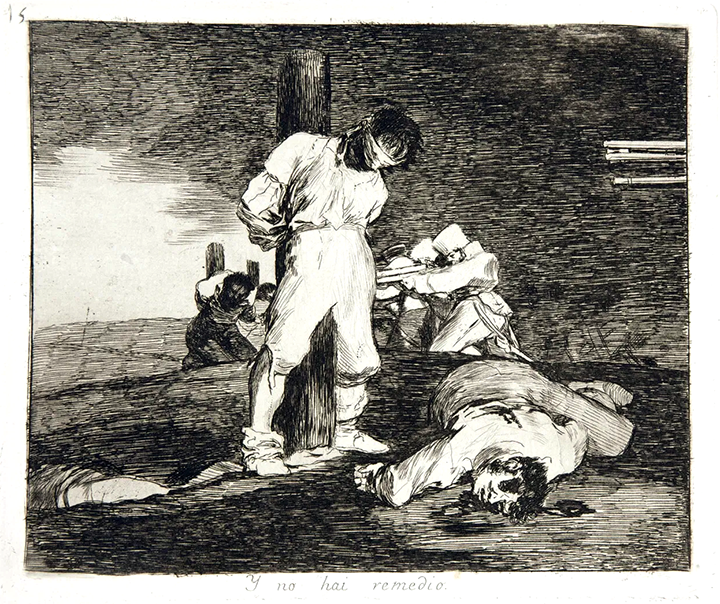
|
||
|
From the series |
A brief word must be added to finalize this portion of the essay and the topic of propaganda art by addressing art and propaganda in totalitarian regimes. As noted earlier, a regime must have more stability than that which existed during most of the French revolution. Moreover, such a regime must also be much more ruthless in sacrificing whatever cultural prestige it may have had among rival states, in suppressing the creative freedom of the artist, and in repudiating arts-for-arts-sake. In short, it must break decisively with the conception of art and the artist, which we owe to fifteen-century Italy.
After World War I propaganda achieved great importance as an instrument of national policy in the totalitarian state. Germany, Italy, Japan, and the Soviet Union deliberated molded public opinion through government propaganda agencies. Every aspect of national life and policy was exploited for purposes of propaganda. Revolutionary leaders had always been aware of the importance of emotion in human affairs.
It was in fact their awareness of

| ||
|
|
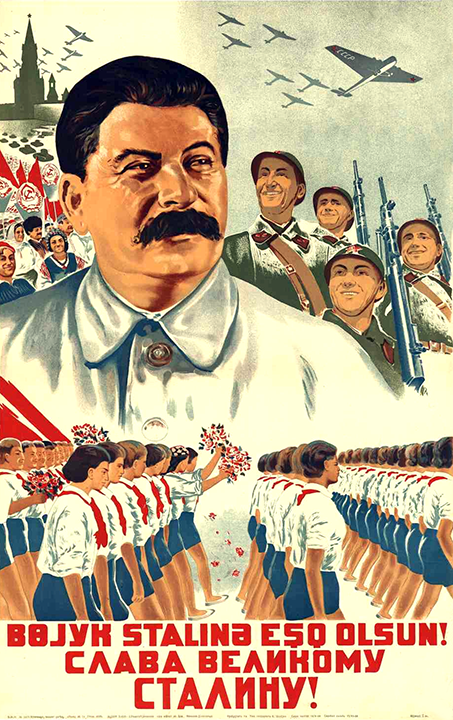
| ||
|
|
Many radical ideas of the role between art and mass culture were explored the final decades of the nineteen-century. But in their slim track

| ||
|
|
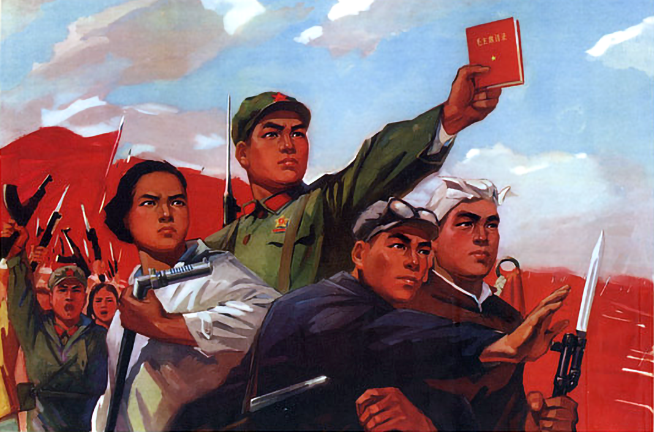
| ||
|
|

| ||
|
|
In the early decades of the twentieth century totalitarian states embraced a shifting mixture of anarchism (ex. China, Argentina), fascism (Nazi Germany, Fascist Italy, Imperialist Japan, and Franco's Spain), socialism (Mexico), and communism (Soviet Union), and came to different conclusions on how art might play a role in social change.
In Mexico, for example (as in many countries outside Europe emerging our of a state of colonialism),

| ||
|
|
The Mexican Mural Movement took advantage of the monumental scale and populist appeal of mural paintings as an instrument for developing class-consciousness and national identity. Marxist ideas of art have been a great influence in Latin American art.

| ||
|
|
In state-communism,
The global influence of Marxism in the arts as well as in politics cannot be underestimated. World famous figures in the arts such as playwrights

| ||
|
|
According to this view, art would get people to understand in a deeper way than they do what is wrong with the society they live in, and with their own relationship to that society, and therefore with their own lives; and it should make them want to change society (notice how this blends so well with what Nina Felshin described as "activist art"). As a result of this view, Marxist view art as a revolutionary instrument and a prime tool of propaganda. Moreover, while many of the Marxist inspired ideologies of the twentieth century have become discredited and impractical in the world today, the Marxist view of the role of art remained strong and comes close to being the prevailing orthodoxy.
The relationship between the United States and the Caribbean island of Puerto Rico has been one of the most talked about, scrutinized, agonized, analyzed, and debated subjects in the history of Latin American-United States relations. This small island with a population density of three and a half million people, that is geographically as well as culturally set in the middle of two worlds who perceive each other (with a few exceptions) as: one Anglo-American, Protestant and white; the other Latin-American13, Catholic and brown, has been called by politicians, scholars and intellectuals:

| ||
|
|
Such an important and significant title is a panoramic reflection of the role an
This begs the question: -Why then does hardly anyone in the United States mainland know anything about Puerto Rico? Oh, they have heard the name in some form or the other, most possibly through its association to popular television shows such as
But, putting all
The focus of this essay is not Puerto Rican history, or American policy in regards to Latin America; the focus of this essay, as was presented in Part One, is manipulation of public opinion through propaganda and propaganda art. But in order to demonstrate how powerful and pernicious propaganda can be in molding public perceptions to the extent of brainwashing, no other example will be more compelling and close to home than that of the propaganda program of
What makes this case study such a good example to work with is that most of the early facts pertaining to this case were so overt that they are in black and white, so to speak. They are part of a history that is
I always felt odd when it occurred to me that I could say
This was my experience during the 1960's and 70's, when I was living in Puerto Rico, a Caribbean island-nation of Spanish-speaking people14 who had been invaded by the United States in 1898 during the Spanish American War. That the Americans had come to stay was never questioned -they were a part of the scenery. The American flag waved next to the Puerto Rican flag in the schoolyard; the United Sates national anthem was played before every ceremony and event (no lyrics, just the music). It was just done; no one understood a word or questioned why. Today, the Americans are still the masters of the island

| ||
|
|
By the end of the nineteenth century, the United States of America had proclaimed its
Well before the outbreak of the war in 1898, the American press built up support for war to accomplish these objectives. Their view was that war was good for business. Historian

| ||
|
|
This pretext to start a war with Spain was the incident of
Not everyone was in favor of America's new diplomacy.

| ||
|
|
Tebbel writes:

| ||
|
|
In the spirit of the times,
The remodelling of Puerto Rico was not simply a matter of appropriating the resources of the land. U.S. leaders also sought to replace Spanish institutions. They had a clear agenda for the Americanization of the island, a requisite for the eventual rule and integration into the United States of a population they perceived as politically immature and unequipped for self-government. One of the causes for their political immaturity (quoted by a senator from Louisiana) was that
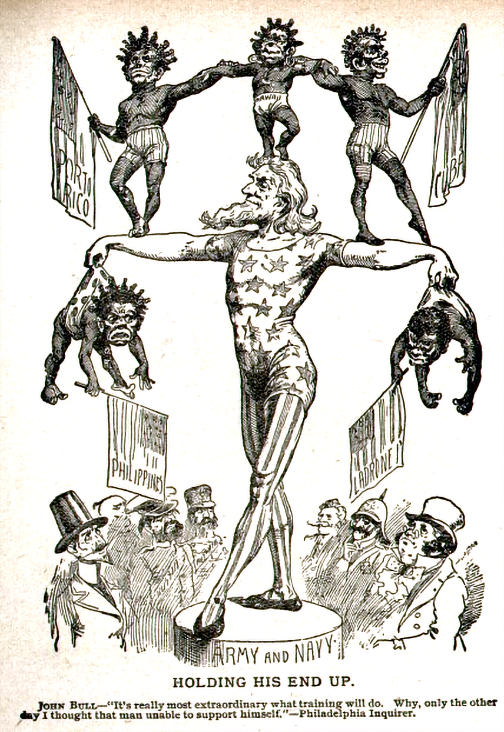
| ||
|
|
Not everyone agreed.
Ironically, Puerto Ricans had painstakingly negotiated from Spain internal autonomy, which was put to an end by the American invasion six months after it was inaugurated. The concessions made by Spain allowed more autonomy to Puerto Rico than it possesses today after one hundred years of American rule.
Historian
This unself-conscious belief in the superiority of everything from the United States drove the extensive reforms implemented by U.S. military administrators. The feeling of inferiority has been one of the most damaging aspects of American propaganda. This has helped perpetuate a colonial mentality of political vacillation and uncomplaining submissiveness.
Then the United States reinforced that sense of inferiority by making Puerto Rico an incorporated territory (not a state, not a nation, not free, a land in political limbo). The native Puerto Rican's rights were not and still are not constitutionally guaranteed; rather, they are congressionally determined. During its first 17 years of American rule, the island citizens were called
An excerpt from a speech delivered by Puerto Rican poet and statesman,
Another myth American propaganda has labored to convincingly create is that Puerto Ricans cannot survive economically on their own. Two weeks after the army landed, a second army of businessmen and speculators invaded the island. According to an editorial by
The local economy was taken over and absentee landowners and corporations appropriated the land. Small farmers (the core of a mostly self-sufficient economy) were taxed out of their farms (for usually less than twenty dollars) providing huge levies of cheap labor for the new American landowners. Commerce was only allowed through U.S. merchant companies whose tariffs were more than double that of the U.S. mainland. Trade with other nations was prohibited [see appendix note at the end of the essay].
There was opposition in Congress from those who thought that these harsh economic measures were a blatant violation of American Ideals and individual freedoms. But their voices were unheard. Here are some quotes:
To create a working class of trained workers for American firms it was first necessary to
Next, the education system was completely reinvented. English was made the official language and a policy of discrimination based on communication began. Within two years, all Puerto Rican schools had reading material in English, U.S. history books, and U.S. maps. Thanks to a donation of a Civil War veteran's organization, boasted the military governor,
During the next four decades, English teachers were brought from the United States and paid by Puerto Ricans at double the wage of local teachers. Puerto Rican teachers were forced to
Hundreds of American teachers have gone to Puerto Rico to teach English, but they were paid with Puerto Rican dollar. None of this came out of the public purse of the United States. Their salaries, along with other expense attached to English instruction, have been a crushing burden on the slender resources of the Island. The last thing the Puerto Rican masses needed was English... Why teach them English when the majority live and die within twenty miles of the ocean and never see it?" 23

| ||
|
|
Puerto Rico's 400 years of history as a people was being systematically erased.

| ||
|
|
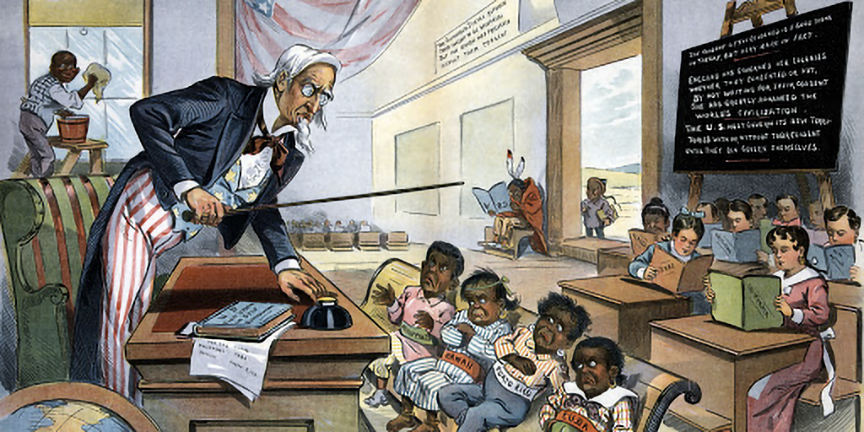
| ||
|
|
What were the motives behind the Americanization Program?
But U.S. administrations failed to notice that you can't mold anything with a sledgehammer. The first fifty years of American occupation and military rule left much to be desired from

| ||
|
The attempt by the United States to impose its language and institutions engendered resentment and fierce adherence to Puerto Ricaness. Photo credit: |
The overt coercive pressure to Americanize in the early decades of U.S. sovereignty (1898 to 1953) was not without effect, particularly on Puerto Rico's legal, educational and military structures. The U.S. influence on Puerto Rican society is undeniable, and a covert program of mass propaganda continues to maintain a positive perception towards American policy of political and economic dependence. But in spite of that, the symbols of Puerto Rican identity have not given way to U.S. replacement.
Puerto Rican leaders generally welcomed the United States take-over of the island because it represented democracy and they thought, the self-rule they had been seeking. But the reluctance of the United States to bestow self-rule and the attempt by the United States to impose its language and institutions engendered resentment and fierce adherence to Puerto Ricaness. In this way, the U.S. pressure in Puerto Rico may have strengthened Puerto Rican identity and Puerto Rican nationalism.
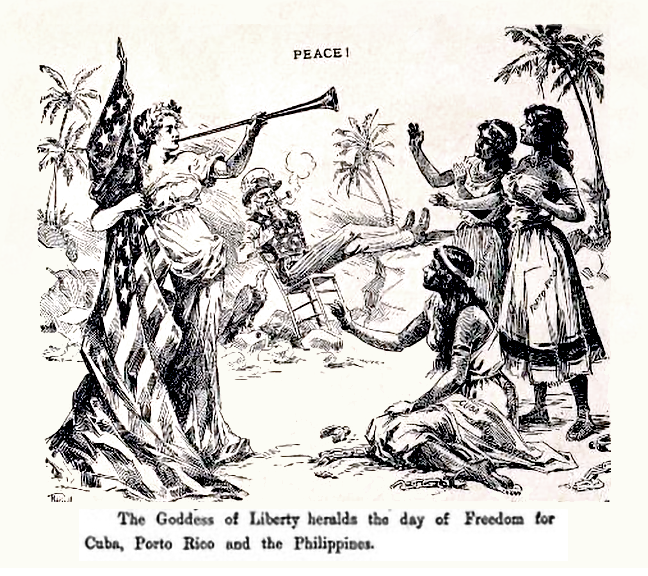
| ||
|
|
U.S. propaganda to the world is that it has
After all, is not the government of Puerto Rico (misleadingly called

| ||
|
|
There has been, since 1947, an expansion of self-government. In fact, Puerto Rico made its greatest economic progress in the 1950's and 1960's, at a time when Puerto Ricans -not Americans- directed the island's local affairs. A number of Americans lent their expertise as consultants and aides, but all key cabinet and legislative posts where held by Puerto Ricans. 27
However, some 85 percent of the basic areas of government that constitute national sovereignty in any generally understood definition of the term (defence, maritime transportation, tariff policy and trade, financial laws, environment, citizenship, juridical appeals, minimum wages and other labor matters, civil aviation, postal, communication, customs, immigration, navigable waters, planning, transfer of federal lands, and military use of the island territory) remain under the jurisdiction and whims of an
Why the need to maintain the lie? World opinion. After all, didn't the last vestiges of nineteenth-century colonialism disappear when the imperialist European powers of old granted independence to their former colonies (mostly in Africa and the West Indies) during the 1960's? Could the United States -the loud bard for democracy and human rights in the world- do no less with its Spanish colony? Obviously, it could (and should have) but it did not.
U.S. policy makers and business leaders felt that Puerto Rico was too good of a prize to let go without some sneaky political manoeuvering. So instead of doing the noble thing by fulfilling the promises of freedom made three days after landing on

| ||
|
The caption reads: |
According to 1989 report from the
Profits to American companies are huge. San Juan is one of the world's 20th busiest container ports because everything has is imported. Consumers in Puerto Rico pay millions of dollars more a year than they would pay for the same products in the U.S. The mass media delivers a constant bombardment of advertisements with large shopping malls are only minutes away from everyone's reach.
Puerto Rican tax laws and enticements have been a godsend for American investors. In the late 1970's, U.S. corporate profits from direct investment in Puerto Rico amounted to more than the total profit from U.S. direct investments in all European countries combined.29 The benefits to the United States are simply too good to let go -or let loose.
The other side of the coin, of course, is Puerto Rico's strategic position to the military. Puerto Rico was for centuries an "Island Fortress". It was key to Spanish power in the region as it is now to the United States. As a result, Puerto Ricans have a long and distinguish military tradition. Along their Spanish overlords, they defended the island against British, Dutch, and French invaders; served under General Galves in the American revolutionary war; fought Spain's colonial wars in Latin America; and have fought for the United States in every conflict since the Spanish American War, in an army they consider "foreign".
In World War I, out of a population of one million three hundred thousand people, one hundred and forty thousand Puerto Rican men served under the American flag (with no desertions). In the Korean conflict, the all-Puerto Rican 65th Infantry was one of the most distinguished, controversial and decorated units of the war. One of the pilots who died on the raid on Libya during the Reagan administration was a Puerto Rican. Wherever there is conflict involving U.S. Armed Forces, the "Boricuas" are there.

| ||
|
The all-Puerto Rican 65th Infantry, |
Puerto Ricans have a strong code of service, loyalty and duty. Over 200,000 have had "the priveledge" to serve in all U.S. wars since WWI, more than 2,000 have made the supreme sacrifice; four were awarded the Congressional Medal of Honor. They have earned the rights that many Americans take for granted. As defenders of "American ideals" they have distinguished themselves in all the branches of the United States Armed Forces and have earned the ranks of General and Admiral in spite of not enjoying full citizenship, not being able to vote in presidential elections for their Commander-in-Chief, not being able to elect the congressional members who send them to war, and without having had the right to be conscientious objectors to the draft.

| ||
|
The all-Puerto Rican 65th Infantry, |
The military presence in Puerto Rico is overwhelming. Under the guise of a "common defence" (who are Puerto Rico's enemies? -Aside from that tale that Fidel Castro is planning to invade) the United States military bases use 13 percent of Puerto Rico's best land and maintain bases in the middle of the island most densely populated metropolitan area. But unlike American bases in other friendly nations, the U.S. does not pay a cent for the use of its land to Puerto Rico.
The United States government spends millions of dollars yearly in Federal Aid to Puerto Rico and Puerto Ricans pay no Federal taxes (up until the 1990's, American companies got huge tax incentives or pay no local tax). However, a fact that is not brought forth when debating issues of economic dependence (the old myth) is that 60 percent of all "federal aid" to Puerto Rico is in fact payment and pensions to federal employees (and its extensive intelligence apparatus) and social security benefits.

| ||
|
|
Another fact that remains hidden is that if the Federal government were to pay the government of Puerto for the "privilege" of having the military use some of the most valuable land for its large military bases, the "aid deficit" would more than balance. In fact, it's a pittance.
This of course is not the perception that the U.S. government wants the Puerto Rican people to dwelt on. Perhaps too much attention on the issue might bring about the realization that if the bases were to be closed the economic development of the land might bring millions of dollars in new industries (probably from Europe and Asia).
And if the trade restrictions were to be lifted and tariffs in the hundreds of millions returned to the Puerto Rican treasury the island might not be left in the catastrophic conditions American propaganda has forecast. The rice might be imported in packages with Chinese writing, its gasoline might come from the South (Venezuela), and there might be a period of privation of luxury items, but in the long term Puerto Ricans will do what do know how to do best: whine, adapt, survive, and prosper.
After more than a century of U.S. sovereignty, after one hundred and three years of partial integration into the institutions of a large powerful country with a history and traditions different from its own, after generations living under the American brand of colonialism, Puerto Ricans have nonetheless managed to endure the non-stop bombardment of a political, economical, cultural and psychological onslaught from a powerful and determined foreign influence.
It begs the question, why after more than a century of American controlling influence and continued propaganda, has the United States failed to Americanize the Puerto Rican people? Part of the answer rests in American difficulty when dealing with cultures different from its own. Gordon K. Lewis' observation -"Americans suffer a cultural ethnocentrism and a moral egocentricity that makes them bad colonial masters", rings truer than ever at the dawning of the twenty-first century.

| ||
|
|
In over a century of U.S. dominion, island leaders have attempted to communicate to the United States two interrelated messages:
Perhaps because of this identity conflict in the Puerto Rican experience, Americans are surprised to learn that Puerto Ricans
This happened in 1917 by an act U.S. Congress, which was voted into law by president
Receiving U.S. citizenship did not mean that Puerto Rican would receive the full rights of American citizenship. To begin with, the Jones Art made certain that all political power stayed in Washington. Neither were the Puerto Rican people truly consulted in any decision-making. They were given
To make things even more demeaning was American determination to deny its
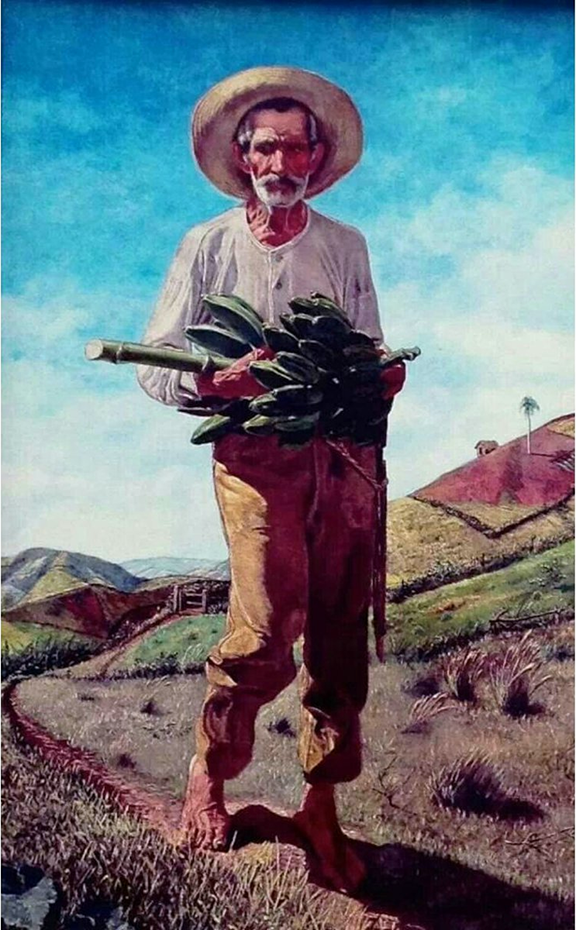
| ||
|
|
By making Puerto Ricans
Puerto Rican cries about empty promises have been -and continue to be- a volatile dilemma for the United States who is always conscious of public opinion at home and abroad. The struggle over
The situation in Vieques, which has received little or no attention by the mainland media -an act that would be comparable to the bombing of Martha's Vineyard by the navy- has strained the American vice-like control of public opinion in Puerto Rico by uniting (probably for the first time in a century) all social, political, and religious factions in the island on a common cause in spite of the increased efforts of American propaganda. This
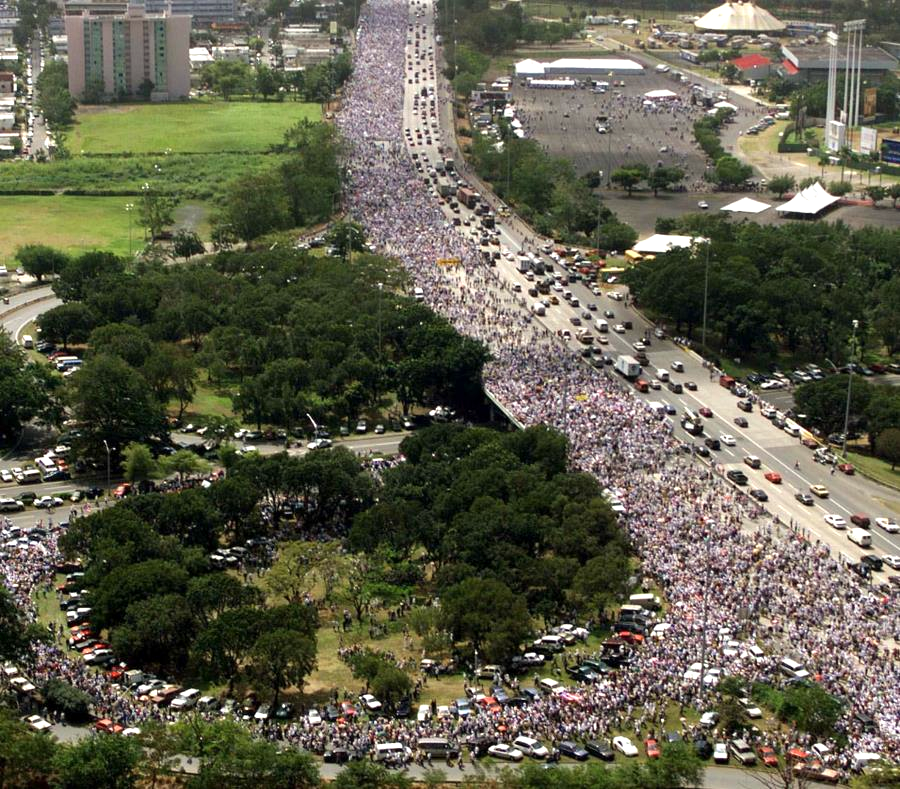
| ||
|
|
The United States is very aware that in the present age of instant communication the spotlight of world public opinion can be brought upon them if enough attention if focus on their colonialist policies on Puerto Rico. A positive perception of the United States must be maintained to control public opinion abroad particularly in a time when America needs to present its better face in other to assert American leadership in world affairs.
Puerto Ricans have not failed to notice this chink on the American juggernaut. They are very aware that the only path available to them in breaking through the barrier of American propaganda is to reach out to the world and change the course of public opinion in their favor.
But why has it taken so long for the people of Puerto Rico to stand up for their rights as a united people? One can argue that American propaganda has been so effective that for over a century it has maintain psychological control over a colonized people. But Puerto Ricans are greatly to blame for their own failure to break this psychological control. How did they fail? Many are the reasons, but I believe they suffer its most damaging blunder by not taking control of one of the most effective tools of counter propaganda:

| ||
|
|
Education is one of the pillars of Puerto Rican society. Family and church are the other two. Educators and intellectuals have traditionally enjoyed great prestige and regard by all levels of the population. Education is seen as the way for upward mobility and social prestige and Puerto Rico enjoys one of the world's highest post-secondary enrollments with students attending twenty-nine private and six public institutions.
But the educational system in Puerto Rico differs from most public educational systems in the U.S. in the way it is controlled. While Americans are adamant about keeping state (and church) away from their public schools, Puerto Rican schools are under the control of a single state agency,

| ||
|
English class in Juana Díaz, Puerto Rico. 1949. Spanish is the language of education; English is ineffectively taught as a second language in grades K to 12. Photo credit: |
I am a product of the Puerto Rican educational system and I believe that in many ways it is more effective that other educational systems, particularly in matters of discipline and methodology (I hold a bachelor's degree in education from
However, we must keep in mind that when The Puerto Rico Department of Education was instituted in 1899 its mission was to implement a program of

| ||
|
|
A long period of U.S.-Puerto Rican history has been whitewashed in the same manner as Japanese involvement in World War II has been whitewashed from Japanese school texts. Consequently, most Puerto Rican students are not introduced to these facts until they enter the halls of higher education, such as
The people of Puerto Rico are facing their present dilemma as members of a nation without nationhood -a people whose past and present are obscured by propaganda and whose collective future is shrouded by uncertainty. Resolving the issue of whether to maintain the status quo, to become the 51st state of the United States, or to gain its independence, is the great schism that has kept Puerto Rico submissive in its colonialism.
Puerto Ricans must also understand that in order to make a decision about their political status and future as a nation as free people
Wanting independence does not make Puerto Ricans anti-American. Wanting statehood does not make Puerto Ricans anti-Puerto Rican. Wanting the version of
Finally, after Puerto Rico has had an opportunity to experience freedom and true nationhood during a pre-determined period of time, Puerto Ricans should decide whether to continue to be an independent nation, or whether to apply to become the 51st state of the United States, or to satisfied the best of both interests by becoming a real Commonwealth in the model of nations that form the British Commonwealth. This will allow for a better resolution of issues such as travel between the two nations, commercial trade, and the continued integration of Puerto Rican resources into the American armed forces. Only by working together will both nations attain a resolution to a not-so-noble chapter of their history and thereafter move ahead as friends.
I am not a politician; I am a Puerto Rican artist born in the United States, raised in Puerto Rico, living in the United States. As a painter I follow the dogma that art should not preach or judge, but make us understand. As a writer I wrestle with both arguments in my conscience and try to understand so that I can be responsible for my words. I apologize for my errors and shortcomings. They are not intentional.
You the reader should not take my words and the thoughts expressed in this essay at face value. It will gain you more if you set out to learn the facts for yourself. I have included an extensive bibliography to get you started. My only intention is to set you off on that journey. But once you complete your journey, remember: publicly express your opinion whatever it may be. You might set others on their own journeys. And, wherever that may take them, I hope, may bring us closer.